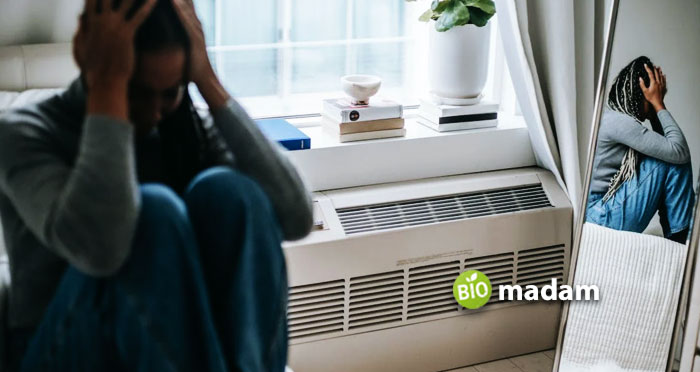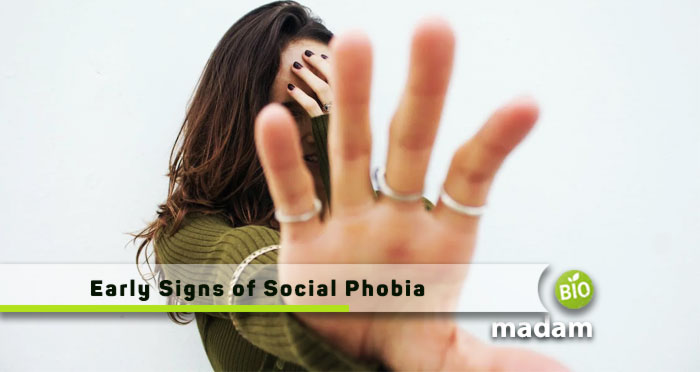Recently updated on September 16th, 2023 at 07:36 am
Social anxiety disorder, also known as social phobia, is a condition in which a person feels overwhelming fear, self-consciousness, and embarrassment in social situations. Social anxiety disorder affects millions of people worldwide, but many don’t recognize the symptoms until it has become a severe problem. That’s why our team prepared this article intending to shed some light on the early signs of social anxiety disorder. That can help you or a loved one identify the condition and seek help on time.
Fear of Being Judged and Criticized
One of the most common signs of social anxiety disorder is a persistent fear of being judged or scrutinized by others. As a result, people with SAD may feel self-conscious and worry that others are constantly evaluating and critiquing their every move. This fear can be so intense that it may prevent them from speaking up in meetings or social events or engaging in social activities that they would otherwise enjoy.
Complete Avoidance of Social Situations
One of the most common early signs of social anxiety disorder is avoiding social situations altogether. People with SAD may go to great lengths to avoid situations that trigger their anxiety, such as parties, public speaking, or even everyday interactions like making phone calls or going to the grocery store. Unfortunately, avoidance can lead to isolation and loneliness, which can exacerbate pre-existing symptoms of obsessive-compulsive disorder, anxiety, and depression.
Social Drinking
Social drinking, or the occasional consumption of alcohol in social situations, is a common practice for people with social anxiety. However, in many cases, social drinking can lead to alcoholism, a chronic disease characterized by the compulsive use of alcohol despite adverse consequences.

Here are some ways that social drinking can lead to alcoholism:
- Social Pressure: In social situations, people may feel pressured to drink alcohol to fit in or feel more comfortable. This social pressure can lead to people drinking more than they typically would or consuming alcohol in situations they may not otherwise have.
- Gradual Tolerance Buildup: When a person regularly consumes alcohol, their body builds up a tolerance. To achieve the same effects alcohol produces, they require higher amounts. This gradual tolerance buildup can lead to a person consuming more alcohol than they initially intended. This, in turn, results in an increased frequency of drinking.
- Psychological Dependence: Social drinking can provide a sense of relaxation, stress relief, and social bonding. Over time, positive associations and psychological dependence on alcohol can develop. At that stage, a person heavily relies on alcohol to cope with stress, anxiety, and social situations.
- False Sense of Control: People who engage in social drinking may feel that they have control over their alcohol consumption and can stop at any time. However, regular consumption of alcohol can lead to the development of physical and psychological dependence, making it difficult to quit.
- The Slippery Slope Effect: Social drinking can start as an occasional or moderate practice. However, the so-called slippery slope effect can occur when a person drinks more frequently or in larger quantities, leading to alcohol abuse and, eventually, alcoholism.
Make sure to seek professional help on time if you or someone you know is struggling with social anxiety disorder and alcohol addiction. Before you begin with therapy, you’ll have to undergo a medical detox. It’s a supervised medical treatment that removes alcohol from your body, helps manage withdrawal symptoms and cravings, and reduces the risk of relapse. In addition, the medical staff is at your disposal 24/7 for additional guidance and support.
Physical Symptoms
Social Anxiety Disorder can also manifest itself in a Range of Physical Symptoms. People with SAD May Experience the Following:
- Racing Heartbeats
- Sweating
- Trembling
- Blushing in Social Situations
- Stuttering
Excessive Self-Consciousness
Excessive self-consciousness is another early sign of social anxiety disorder. People with SAD may be hyper-aware of their physical appearance, speech patterns, and behavior in social situations. For this reason, they constantly worry about being judged negatively by others. This self-consciousness can lead to a cycle of negative self-talk and low self-esteem, followed by increased anxiety.
Negative Self-Talk

People with social anxiety disorder often engage in negative self-talk, fueling their anxiety and preventing them from engaging in social situations. Negative self-talk can take many forms, such as worrying about being judged or rejected, catastrophizing potential social situations, or focusing on past social failures. This negative self-talk can make it difficult for people with SAD to challenge their anxiety.
Difficulty Relaxing
People with a social anxiety disorder may have difficulty relaxing, even when not in social situations. They may worry about upcoming social events, replay past social interactions in their minds, or be unable to turn off their internal dialogue about social situations. This chronic state of anxiety can be exhausting and prevent people with SAD from enjoying their free time or engaging in self-care activities.
Treatments that Help Mitigate the Symptoms of SAD
Social anxiety disorder is a treatable condition, and there are many effective therapies recommended by Archstone Behavioral Health addiction recovery experts. Some of the most effective treatments for social anxiety disorder include:
- Cognitive-Behavioral Therapy (CBT): CBT is a type of therapy that helps people with SAD identify and challenge negative thought patterns and behaviors. It is often used in conjunction with exposure therapy. It involves gradually exposing people with SAD to feared social situations in a safe and supportive environment.
- Medication: Antidepressant medications can effectively reduce signs and symptoms of social anxiety disorder. These medications balance neurotransmitters in the brain associated with mood and anxiety.
- Support Groups: Support groups can be a valuable resource for people with social anxiety disorder, as they provide a safe and supportive environment to share experiences and learn coping strategies.
- Supplementary Treatments: Many rehab facilities incorporate Yoga and breathing techniques to make recovery more wholesome.

Recognizing the early signs of social anxiety disorder is the first step in seeking help and treatment. If you or a loved one is experiencing any of these symptoms, you must reach out to a healthcare professional for diagnosis and support. Treatment options include therapy, medication, or a combination of both, and can help individuals with social anxiety disorder lead fulfilling and thriving lives.

Hi, they call me Jenna, and I am also known for achieving a gold medal during my Ph.D. in science life. I always had a dream to educate people through my utmost writing hobby. So, I chose this blogging path, and Biomadam gave me this opportunity to present for them. I now stand to entertain you. Continue reading my articles & discuss if you’ve any confusion through the comment section below.

